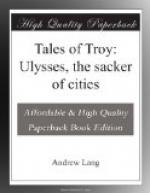Meanwhile, the Greeks made an assault against the Trojan walls and fought long and hardily; but, being safe behind the battlements, and shooting through loopholes, the Trojans drove them back with loss of many of their men. It was in vain that Philoctetes shot his poisoned arrows, they fell back from the stone walls, or stuck in the palisades of wood above the walls, and the Greeks who tried to climb over were speared, or crushed with heavy stones. When night fell, they retreated to the ships and held a council, and, as usual, they asked the advice of the prophet Calchas. It was the business of Calchas to go about looking at birds, and taking omens from what he saw them doing, a way of prophesying which the Romans also used, and some savages do the same to this day. Calchas said that yesterday he had seen a hawk pursuing a dove, which hid herself in a hole in a rocky cliff. For a long while the hawk tried to find the hole, and follow the dove into it, but he could not reach her. So he flew away for a short distance and hid himself; then the dove fluttered out into the sunlight, and the hawk swooped on her and killed her.
The Greeks, said Calchas, ought to learn a lesson from the hawk, and take Troy by cunning, as by force they could do nothing. Then Ulysses stood up and described a trick which it is not easy to understand. The Greeks, he said, ought to make an enormous hollow horse of wood, and place the bravest men in the horse. Then all the rest of the Greeks should embark in their ships and sail to the Isle of Tenedos, and lie hidden behind the island. The Trojans would then come out of the city, like the dove out of her hole in the rock, and would wander about the Greek camp, and wonder why the great horse of tree had been made, and why it had been left behind. Lest they should set fire to the horse, when they would soon have found out the warriors hidden in it, a cunning Greek, whom the Trojans did not know by sight, should be left in the camp or near it. He would tell the Trojans that the Greeks had given up all hope and gone home, and he was to say that they feared the Goddess Pallas was angry with them, because they had stolen her image that fell from heaven, and was called the Luck of Troy. To soothe Pallas and prevent her from sending great storms against the ships, the Trojans (so the man was to say) had built this wooden horse as an offering to the Goddess. The Trojans, believing this story, would drag the horse into Troy, and, in the night, the princes would come out, set fire to the city, and open the gates to the army, which would return from Tenedos as soon as darkness came on.
The prophet was much pleased with the plan of Ulysses, and, as two birds happened to fly away on the right hand, he declared that the stratagem would certainly be lucky. Neoptolemus, on the other hand, voted for taking Troy, without any trick, by sheer hard fighting. Ulysses replied that if Achilles could not do that, it could not be done at all, and that Epeius, a famous carpenter, had better set about making the horse at once.




